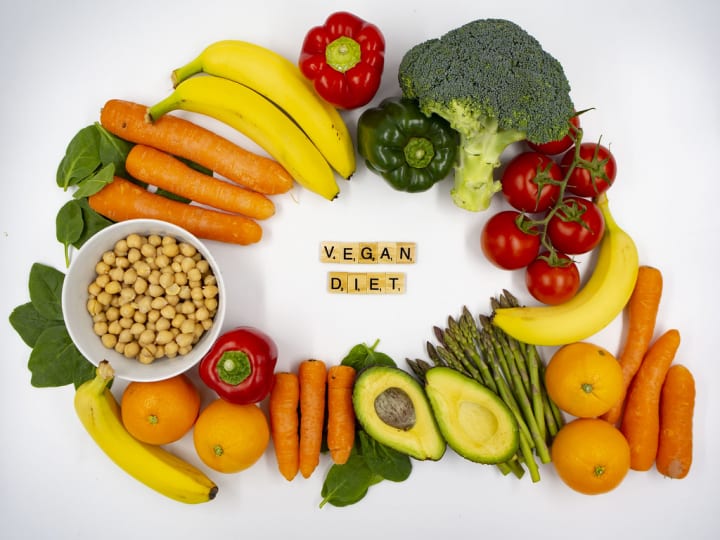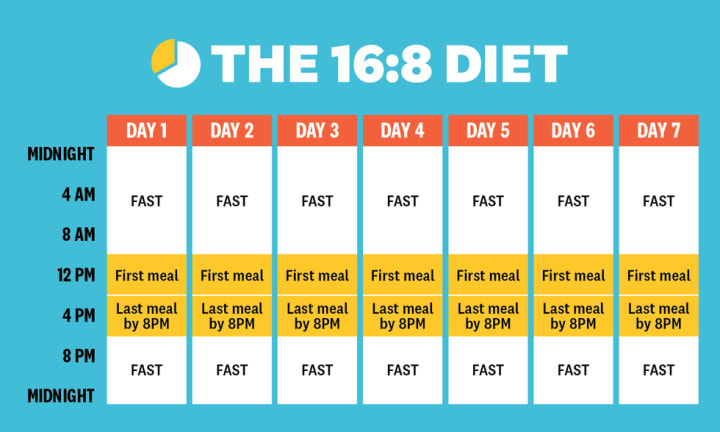Type of D-I-E-T to Follow
Diet types and explanation

There are several types of diets that one can follow, some of the most popular ones are:
Vegan Diet
A vegan diet is based on plants and eliminates all animal products, including meat, dairy, eggs, and honey. This type of diet is often high in fiber, vitamins, and minerals, but it can also be low in certain nutrients such as vitamin B12 and omega-3 fatty acids. To ensure adequate nutrient intake, vegans may need to take supplements and eat a variety of fortified foods.

Vegetarian Diet
A vegetarian diet eliminates meat, poultry, and seafood, but may include dairy and eggs. Like a vegan diet, a vegetarian diet can be high in fiber, vitamins, and minerals, but it may also be low in certain nutrients like vitamin B12. Vegetarians who include dairy and eggs in their diet may have an easier time meeting their nutritional needs, but they should still be mindful of their nutrient intake.
Mediterranean Diet
The Mediterranean diet is based on the traditional foods consumed by people living in the Mediterranean region, such as Greece and Italy. This diet emphasizes eating whole, minimally processed foods, such as fruits and vegetables, whole grains, legumes, and healthy fats like olive oil. The Mediterranean diet is high in fiber, antioxidants, and heart-healthy monounsaturated fats, and has been shown to reduce the risk of heart disease, stroke, and certain types of cancer.

Keto Diet
The ketogenic, or "keto," diet is a high-fat, low-carb diet that aims to put the body into a state of ketosis, in which it burns fat for fuel instead of carbohydrates. This type of diet can be effective for weight loss, but it can also be challenging to follow and may be low in certain nutrients like fiber. The keto diet should be followed under the supervision of a healthcare professional, as it can have potential side effects like increased cholesterol levels and liver problems.

Paleolithic Diet
The Paleolithic, or "Paleo," diet is based on the idea of eating whole, unprocessed foods similar to those consumed by early humans. This diet eliminates processed foods, grains, legumes, and dairy, and emphasizes meat, fish, vegetables, and fruit. The Paleo diet can be high in protein and healthy fats, but it may also be low in certain nutrients like calcium and fiber.

Intermittent Fasting
Intermittent fasting involves alternating periods of eating with periods of fasting. There are several different methods of intermittent fasting, such as the 16/8 method (fasting for 16 hours and eating within an 8-hour window) and the 5:2 diet (eating normally for 5 days and restricting calorie intake for 2 days). Intermittent fasting has been shown to have potential health benefits like weight loss and improved metabolism, but it may not be suitable for everyone and should be followed under the supervision of a healthcare professional.

Whole Food Plant-based Diet
A whole food plant-based diet emphasizes eating whole, minimally processed foods, primarily from plants. This type of diet is high in fiber, antioxidants, and heart-healthy nutrients, and has been shown to reduce the risk of heart disease, stroke, and certain types of cancer. Like a vegan diet, a whole food plant-based diet may be low in certain nutrients like vitamin B12, so it's important to be mindful of nutrient intake and consider taking supplements as needed.

In conclusion, there are many different types of diets that one can follow, each with its own set of benefits and drawbacks. Some popular diets include the vegan diet, the vegetarian diet, the Mediterranean diet, the ketogenic diet, the Paleolithic diet, intermittent fasting, and the whole food plant-based diet.
Before starting any new diet, it's important to consider your personal health goals and to consult with a healthcare professional to ensure that the diet is safe and appropriate for you. Additionally, it's important to keep in mind that no single diet is right for everyone, and that finding the right diet for you may involve some trial and error. Ultimately, the most important factor in maintaining good health is a balanced diet that provides adequate nutrients and is sustainable in the long term.






Comments
There are no comments for this story
Be the first to respond and start the conversation.